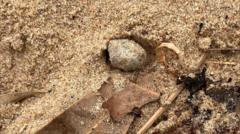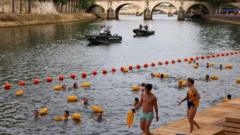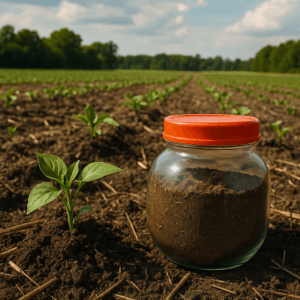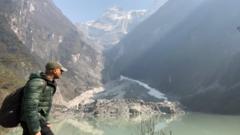On January 14, several Sydney beaches were closed due to mysterious marble-sized balls found to contain harmful bacteria and saturated fatty acids, prompting an environmental investigation.
Mysterious beach debris in Sydney linked to faecal bacteria and E. coli

Mysterious beach debris in Sydney linked to faecal bacteria and E. coli
Authorities investigate sources of beach closures as contaminated balls wash ashore
The recent discovery of strange, marble-sized balls along Sydney's Northern Beaches has led to the closure of nine popular beaches, including the well-known Manly and Dee Why, due to health concerns. Initial tests revealed that these balls contain saturated fatty acids, E. coli, and fecal bacteria, raising alarms about water safety and public health.
The Northern Beaches Council has escalated the issue by sending samples of the debris to the New South Wales Environment Protection Authority (EPA) for comprehensive analysis. The council initially closed the beaches on January 14 after reports of these balls washing ashore, reminiscent of a similar incident last October when black blobs caused closures and a widespread cleanup operation.
Recent weeks have seen cleanup efforts for the newly found balls, which were found to also contain volcanic rock pumice. Northern Beaches mayor Sue Heins expressed hope that the EPA will identify the source of this hazardous debris to prevent future occurrences. She emphasized the importance of community vigilance, urging residents to report any sightings rather than handle the materials themselves.
The incident follows previous reports from October, where initial assessments mistakenly labeled the debris as "tar balls." Further examinations uncovered a mix of materials, including cooking oils, soap scum, and various pharmaceuticals and contaminants, some resembling fat, oil, and grease blobs often known as "fatbergs." Despite these alarming findings, Sydney Water confirmed that its treatment facilities are functioning normally and no systemic problems have been identified.
As investigations continue, the local community remains on high alert, focusing on ensuring safe beach conditions for residents and visitors alike.
The Northern Beaches Council has escalated the issue by sending samples of the debris to the New South Wales Environment Protection Authority (EPA) for comprehensive analysis. The council initially closed the beaches on January 14 after reports of these balls washing ashore, reminiscent of a similar incident last October when black blobs caused closures and a widespread cleanup operation.
Recent weeks have seen cleanup efforts for the newly found balls, which were found to also contain volcanic rock pumice. Northern Beaches mayor Sue Heins expressed hope that the EPA will identify the source of this hazardous debris to prevent future occurrences. She emphasized the importance of community vigilance, urging residents to report any sightings rather than handle the materials themselves.
The incident follows previous reports from October, where initial assessments mistakenly labeled the debris as "tar balls." Further examinations uncovered a mix of materials, including cooking oils, soap scum, and various pharmaceuticals and contaminants, some resembling fat, oil, and grease blobs often known as "fatbergs." Despite these alarming findings, Sydney Water confirmed that its treatment facilities are functioning normally and no systemic problems have been identified.
As investigations continue, the local community remains on high alert, focusing on ensuring safe beach conditions for residents and visitors alike.























